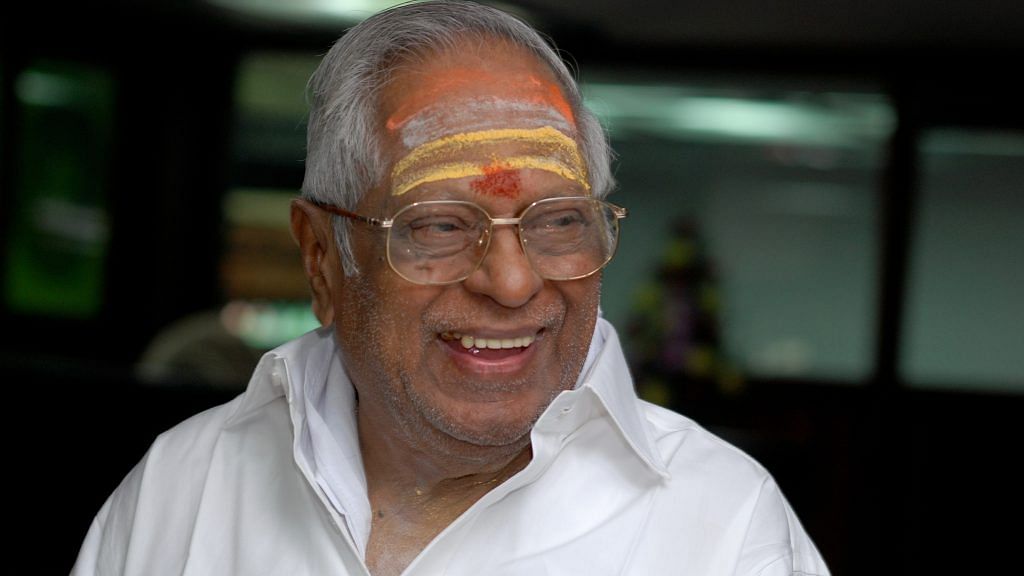New Delhi: It wouldn’t be incorrect to say that music holds a crucial place in south Indian cinema, perhaps, even more so than in Bollywood. In its over-100-year journey, a few names have moulded, and transformed, the way music is used in south Indian cinema. In the Tamil film industry, one of them, undoubtedly, was music composer M.S. Viswanathan, or MSV as he was known.
On his 91st birth anniversary, ThePrint revisits the extraordinary life of MSV, who rose from abject poverty to become one of the biggest names in the Indian music industry.
Early life
Born in Elappully near Palakkad in Kerala, on 24 June 1928, M.S. Viswanathan had an extremely difficult childhood.
After the death of his father and sister in 1932, MSV’s mother decided to drown herself and her four-year-old son to escape penury, by jumping into a well. However, they were saved by his grandfather.
He later sold food at the local theatre, and would often spend time listening to the songs in films. His talent was discovered by musician Neelakanta Bagavathar, when he found the boy playing the harmonium and singing by himself outside Bagavathar’s classes. He took MSV under his wings and trained him.
Viswanathan–Ramamoorthy
At the age of 12, he started his film journey at Jupiter Films, a major film production house that made some of the biggest Tamil hits in the 1950s and 1960s like Manohara (1954), Karpukkarasi (1957) and Thangapathumai (1959).
While he was working at Jupiter Films as an office boy, he was taken on as a harmonium player in music director C.R. Subburaman’s troupe. It was here that he met violinist T.K. Ramamoorthy, with whom he later formed a musical duo in the Tamil film industry.
When Subburaman passed away in 1952, the duo took over his incomplete projects — Devadas (1953) and Chandirani (1953). There was no looking back after that point.
It was MSV’s idea to work together, Ramamoorthy revealed in an interview. “Why don’t we work like Shanker and Jaikishen, as a duo?” A sceptical Ramamoorthy agreed hesitantly.
“We worked in tandem. I’d add nuances to his compositions wherever I could, introduce notes, play the violin and conduct or sit in the chamber. Even a minor error couldn’t escape my ears. I’d immediately identify the doer and the deed,” said Ramamoorthy.
The duo composed music for films for over a decade, between 1952 and 1965, including for top Tamil actors like M.G. Ramachandran, Sivaji Ganesan and Jayalalithaa — all three later became Tamil Nadu chief ministers.
The duo parted ways in 1965 to pursue solo prospects, but reunited once again in 1995 for the Tamil film Engirundho Vanthan.
‘He only knows music’
Viswanathan may have been trained in Carnatic music only, but his compositions for films — 1,700 of them in a career spanning close to 50 years — were imbued with non-traditional elements and influences of Western music.
His songs were always light and romantic, so much so that he, along with Ramamoorthy was conferred the title of ‘Mellisai Mannar’ or ‘The King of Light Music’ in 1963.
Any musician who worked with MSV over the years, including A.R. Rahman and Ilaiyaraaja, would attest to his prodigious talent, wherein he would compose songs within minutes and record them in less than a day.
Lyricist Kannadasan, a close friend and colleague of MSV, once recounted an anecdote to illustrate his grasp on music.
“We boarded a plane and he misread Toilet and asked me what the rent was. We landed in Kabul and asked me what Afghanistan meant and who Muhammad Ghori was. We went to Tashkent and he was listless. We went to Leningrad (Saint Petersburg) and when I introduced him to someone, he mistook engineering for a vegetable. He was really quite hopeless. Our host took us to the Tchaikovsky concert hall and showed us a piano that the great Russian supposedly played on. Viswanathan couldn’t pronounce Tchaikovsky. But he sat at the piano and, for 30 minutes, played the maestro’s concerto. Naturally, the Russians were spellbound. He really knows nothing. Nothing but music.”
For any listener, it would be difficult to list out the greatest hits of a composer who had such an extensive discography, but some songs automatically pop up — ‘Thulluvadho Ilamai’ from Kudiyirundha Koyil (1968), ‘Avalukkenna’ from Server Sundaram (1964), and ‘Ezhu Swarangalukkul’ from 1975’s Apoorva Raagangal, which won him a National Award, and many more.
MSV started out as a child who wanted to act — and he did act in a handful of Tamil and Telugu films — but life had other plans for him.
On 14 July 2015, he died after battling age-related health issues, but not before leaving behind a vast legacy of work.
Also read: Ariyakkudi, maestro who woke up snoring crowds at concerts & made modern-day Carnatic music
